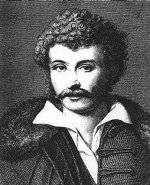The directory «Plots of stamps in the catalogue»
Kisfaludy Károly
(1788—1830)

Hungarian author, was born at Tete, near Raab, on the 6th of February 1788. His birth cost his mother her life and himself his father's undying hatred. He entered the army as a cadet in 1804; saw active service in Italy, Servia and Bavaria (1805-1809), especially distinguishing himself at the battle of Leoben (May 25, 1809), and returned to his quarters at Pest with the rank of first lieutenant. It was during the war that he composed his first poems, e.g. the tragedy Gyilkos (" The Murder," 1808), and numerous martial songs for the encouragement of his comrades. It was now, too, that he fell hopelessly in love with the beautiful Katalin Heppler, the daughter of a wealthy tobacco merchant. Tiring of the monotony of a soldier's life, yet unwilling to sacrifice his liberty to follow commerce or enter the civil service, Kisfaludy, contrary to his father's wishes, now threw up his commission and made his home at the house of a married sister at Vorrock, where he could follow his inclinations. In 1812 he studied painting at the Vienna academy and supported himself precariously by his brush and pencil, till the theatre at Vienna proved a still stronger attraction. In 181 2 he wrote the tragedy Kldra Zdch, and in 1815 went to Italy to study art more thoroughly. But he was back again within six months, and for the next three years flitted from place to place, living on the charity of his friends, lodging in hovels and dashing off scores of daubs which rarely found a market. The united and repeated petitions of the whole Kisfaludy family failed to bring about a reconciliation between the elder Kisfaludy and his prodigal son. It was the success of his drama Ilka, written for the Fehervar dramatic society, that first made him famous and prosperous. The play was greeted with enthusiasm both at Fehervar and Buda (1819). Subsequent plays, The Voivode Stiber and The Petitioners (the first original Magyar dramas), were equally successful. Kisfaludy's fame began to spread. He had found his true vocation as the creator of the Hungarian drama. In May 1820 he wrote three new plays for the dramatic society (he could always turn out a five-act drama in four days) which still further increased his reputation. From 1820 onwards, under the influence of the great critic Kazinczy, he learnt to polish and refine his style, while his friend and adviser GyOrgy Gaal (who translated some of his dramas for the Vienna stage) introduced him to the works of Shakespeare and Goethe. By this time Kisfaludy had evolved a literary theory of his own which inclined towards romanticism; and in collaboration with his elder brother Alexander (see below) he founded the periodical Aurora (182 2), which he edited to the day of his death. The Aurora was a notable phenomenon in Magyar literature. It attracted towards it many of the rising young authors of the day (including VBrdsmarty, Bajza and Czuczor) and speedily became the oracle of the romanticists. Kisfaludy's material position had now greatly improved, but he could not shake off his old recklessness and generosity, and he was never able to pay a tithe of his debts. The publication of Aurora so engrossed his time that practically he abandoned the stage. But he contributed to Aurora ballads, epigrams, short epic pieces, and, best of all, his comic stories. Kisfaludy was in fact the founder of the school of Magyar humorists and his comic types amuse and delight to this day. When the folk-tale became popular in Europe, Kisfaludy set to work upon folk-tales also and produced (1828) some of the masterpieces of that genre. He died on the 21st of November 1830. Six years later the great literary society of Hungary, the Kisfaludy Tdrsasdg, was founded to commemorate his genius. Apart from his own works it is the supreme merit of Kisfaludy to have revived and nationalized the Magyar literature, giving it a range and scope undreamed of before his time.
The first edition of Kisfaludy's works, in 10 volumes, appeared at Buda in 1831, shortly after his death, but the 7th edition (Budapest 1893) is the best and fullest. See Ferenc Toldy, Lives of the Magyar Poets (Hung.) (Budapest, 1870); Zsolt Betithy, The Father of Hungarian Comedy (Budapest, 1882); Minas Szana, The Two Kisfaludys (Hung.) (Budapest, 1876). Kisfaludy's struggles and adventures are also most vividly described in Jokai's novel, Eppur si muove (Hung.).
Hungary, 1980, Károly Kisfaludy
Hungary, 1980.11.21,  Budapest. Karoly Kisfaludy
Budapest. Karoly Kisfaludy